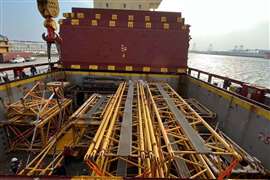Fehmarnbelt ready for next stage
03 January 2019

Approval for the world’s longest combined road and rail tunnel is ready to be signed, although some of its funding may now be in doubt after a ruling in the Court of Justice of the European Union.
The Fehmarnbelt tunnel is designed to link Germany and Denmark, and the Ministry of Transport of Schleswig-Holstein, Germany, has said that the plan approval of the Fehmarnbelt tunnel is ready to be signed.
The tunnel will be the world’s longest immersed road and rail tunnel. It will shorten the journey between the German and Danish coasts to just 10 minutes by car and seven minutes by train compared to the current travel time of one hour by ferry or a 160km detour via the Danish region of Jutland by car.
An immersed tunnel made up of hollow concrete elements, cast on land and assembled section by section to form the tunnel, will be used.
In accordance with German regulations, Femern – the Danish state-owned company tasked with designing and planning the link – was given 14 days to review the approval before it is signed, although during this process, only minor editorial changes may be made.
Claus Dynesen, project director at Femern, said, “I am delighted and proud that we have today reached this crucial milestone. This is the result of several years of co-operation between the parties involved in Denmark and Germany.
“The approval means that agreement has now been reached between the German authorities and Femern on how to construct the tunnel.”
The application has been through two major public rounds of consultation in Germany since it was submitted for the first time in autumn 2013.

“The plan approval determines the requirements and conditions that must be met, especially in relation to the environment, in order for Femern’s construction work on the German side to proceed. We will now thoroughly analyse the approval, and then, during the spring, we will present scenarios on how we will achieve the project goals,” said Dynesen.
The German plan approval may be appealed to the Federal Administrative Court in Leipzig. Femern said it had prepared thoroughly with this in mind. German legal proceedings will determine when construction can begin in earnest on the German side.
Most of the Fehmarnbelt construction work will take place on the Danish side at Rødbyhavn, where the large scale factory and work harbour for the production of the 70,000 tonne tunnel elements will be located.
Verdict
Meanwhile, in the weeks before Christmas, the Court of Justice of the European Union (CJEU) gave a verdict on a complaint by ferry companies Scandlines and Stena Lines regarding the European Commission’s approval of state aid to the Fehmarnbelt project.
Scandlines said that the CJEU had “cancelled the approval” of the Fehmarn connection’s financing model.
“In July 2015,” the company said, “the EU Commission forced through an approval of the Fehmarn project’s financing model without opening a formal procedure and thus without involving the private and public companies – including Scandlines – that had filed complaints about the model.”
Søren Poulsgaard Jensen, CEO of Scandlines, said, “We are satisfied with the ruling of the Court of Justice of the European Union. The approval of the state aid model has now been cancelled and the Fehmarn project stopped.
“Scandlines is not against a Fehmarn connection established with state aid. State aid may be necessary when completing such large-scale projects. However, we do expect correct procedure, which entails transparency and fair competition. The aid must therefore be accurately and realistically defined, and it must be based on consistent assumptions and safeguarded against abuse.”
He said that it was decisive for the company that the tunnel could not use the state finances as its saw fit “to impose taxpayer-financed price pressure when traffic volumes do not live up to the optimistic prognoses and the ferries appear competitive”.
He said, “For the Commission, this is basically a ‘do-over’ with a three-year delay. It is better late than never, but it is thought-provoking that we as a private company have to spend time and money on ensuring that the EU Commission complies with applicable rules.”
Poulsgaard Jensen said that in addition to the “inadequate active consideration”, a contributory reason for the Scandlines complaint was that the Commission, following a request from the Danish state, approved state aid for at least 55 years following the opening of the tunnel, “which in reality is an undertaking to provide state aid for an indefinite period to this high-risk project”.
He said, “This unprecedented long and indefinite period is in stark contrast to the payback time, 36 years, which Femern and the Danish state propagate nationally when the project’s solid character is accentuated and the socio-economic value of the Fehmarn investment is presented to legitimise the project.”
At Stena, Claes Berglund, director of public affairs and sustainability, said, “As a private company, we are used to and expect competition on fair and equal terms. In this case, state aid has been granted illegally.
“That’s why we welcome the decision from the court to annul the aid granted by the Commission for the construction of the Fehmarn Belt connection.”
He added, “Before we are able to see the consequences and what actions we should take or expect the Commission to take, we need to analyse the ruling in detail.”
Similar case
Femern also said it would now read the verdict closely and discuss the matter with the its lawyers. It said that in September 2018, the Court of Justice of the European Union had given a verdict in a similar case regarding the Oresund Fixed Link between Denmark and Sweden.

Based on Femern’s preliminary reading of the verdict, it said it appeared that the Court of Justice of the European Union had concluded that the EU Commission made an error by not initiating a so-called “formal investigation procedure” in connection with its decision in the state aid case.
Femern said the validity of the state guarantee model was not contested, but there were some procedural errors in connection with the EU Commission’s approval.
The Commission now has the opportunity to rectify and repair these errors and provide a new approval, it said.
Femern added that it had prepared for this situation and secured the necessary liquidity during such a repair period, so that the Fehmarnbelt project was not being halted. It said the verdict was not expected to have any consequences on EU financial support for the Fehmarn project.



